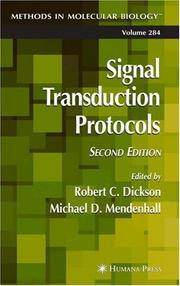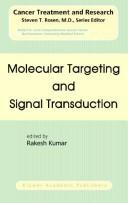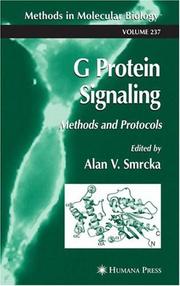| Listing 1 - 4 of 4 |
Sort by
|

ISBN: 1588292452 1592598161 9786610359899 1280359897 9781592598168 9781588292452 Year: 2004 Volume: 284 Publisher: Totowa, NJ : Humana Press : Imprint: Humana,
Abstract | Keywords | Export | Availability | Bookmark
 Loading...
Loading...Choose an application
- Reference Manager
- EndNote
- RefWorks (Direct export to RefWorks)
Carrying on the high standards of the much-acclaimed first edition, highly experienced investigators have extensively updated Signal Transduction Protocols with many of the new approaches that have been transforming the field. Included in this new edition are readily reproducible immunoassays, fluorescence-based assays, high-throughput methods, protein modification assays, lipid second messenger assays, and chromatin immunoprecipitation techniques. Wherever possible, protocols for the assay of general classes of signal transduction components have been identified so they can be adapted to the assay of any member of that class. The protocols follow the successful Methods in Molecular Biology™ series format, each one offering step-by-step laboratory instructions, an introduction outlining the principle behind the technique, lists of the necessary equipment and reagents, and tips on troubleshooting and avoiding known pitfalls. State-of-the-art and eminently practical, Signal Transduction Protocols, 2nd ed. offers novice and experienced researchers alike an indispensable set of standardized, but readily adaptable, approaches for the assay of key signaling molecules-an invaluable tool for all laboratories newly entering the field, expanding the breadth of previous investigations, or seeking to improve an existing approach.
Cellular signal transduction --- G proteins --- Cell receptors --- GTP-Binding Proteins --- Signal Transduction --- analysis --- physiology --- Cell membrane receptors --- Cell surface receptors --- Receptors, Cell --- Binding sites (Biochemistry) --- Cell membranes --- Proteins --- GTP-binding proteins --- GTP regulatory proteins --- Guanine nucleotide-binding proteins --- Guanine nucleotide regulatory proteins --- Membrane proteins --- Cellular information transduction --- Information transduction, Cellular --- Signal transduction, Cellular --- Bioenergetics --- Cellular control mechanisms --- Information theory in biology --- Cytology. --- Cell Biology. --- Cell biology --- Cellular biology --- Biology --- Cells --- Cytologists --- Cellular signal transduction - Laboratory manuals --- G proteins - Laboratory manuals --- Cell receptors - Laboratory manuals --- GTP-Binding Proteins - analysis - laboratory manuals --- Signal Transduction - physiology - Laboratory Manuals

ISBN: 1280148314 9786610148318 1402078471 1402078226 Year: 2004 Publisher: Boston, Massachusetts : Kluwer Academic Publishers,
Abstract | Keywords | Export | Availability | Bookmark
 Loading...
Loading...Choose an application
- Reference Manager
- EndNote
- RefWorks (Direct export to RefWorks)
Drug targeting. --- Cellular signal transduction. --- Cancer cells. --- Cellular information transduction --- Information transduction, Cellular --- Signal transduction, Cellular --- Bioenergetics --- Cellular control mechanisms --- Information theory in biology --- Cells --- Pathology, Cellular --- Drugs --- Site-specific drug delivery --- Targeting of drugs --- Target organs (Anatomy) --- Targeting --- Dosage forms
Book
ISBN: 1280537132 9786610537136 030648529X 0306484714 Year: 2004 Publisher: New York : Kluwer Academic Publishers,
Abstract | Keywords | Export | Availability | Bookmark
 Loading...
Loading...Choose an application
- Reference Manager
- EndNote
- RefWorks (Direct export to RefWorks)
INTEGRATION OF METABOLISM, ENERGETICS, AND SIGNAL TRANSDUCTION Unifying Foundations in Cell Growth and Death, Cancer, Atherosclerosis, and Alzheimer Disease ROBERT K. OCKNER "Dr. Ockner has written a fascinating and original book which explores potential metabolic links to neurodegeneration. He takes a fresh look at metabolic pathways involving interaction between astrocyte and neuron that are important for brain health and may play a significant role in the pathogenesis of Alzheimer disease and other normal and pathological phenomena. Dr. Ockner has a distinguished research career in fatty acid metabolism and the fatty acid binding proteins and writes with clarity upon this under-explored aspect of the brain in health and disease. Not only is his book important for understanding links between systemic and cerebral metabolism in neurodegeneration, but is a must read for scientists with an interest in the connection between metabolic pathways and brain function." — Dr. Bruce Miller, Professor of Neurology Clinical director of the Memory and Aging Center University of California, San Francisco "I find this book to be a commendable and comprehensive undertaking as it encompasses an evaluation of a wide area of scientific research. Researchers working in lipid metabolism to those interested in mitochondrial energetics and in the mechanisms of signal transduction pathways in cancer and Alzheimer disease will benefit from this book." —M.A.Q. Siddiqui, Professor and Chairman of the Department of Anatomy and Cell Biology SUNY Downstate, Brooklyn, NY Robert K. Ockner, M.D. is Professor of Medicine at the University of California, San Francisco, and is former Director of the UCSF Liver Center and Division of Gastroenterology. He and colleagues initially identified and characterized the cytosolic fatty acid binding proteins. He is a graduate of the Harvard Medical School and completed clinical and research training at Boston City Hospital, National Institutes of Health, and Massachusetts General Hospital. Cover art by Sadie McFarlane.
Cell metabolism. --- Energy metabolism. --- Cellular signal transduction. --- Fatty acids --- Pathology, Cellular. --- Metabolism. --- Neurology. --- Biochemistry. --- Applied psychology. --- Neurosciences. --- Biochemistry, general. --- Biological Psychology. --- Neurology . --- Biological psychology. --- Neural sciences --- Neurological sciences --- Neuroscience --- Medical sciences --- Nervous system --- Biological psychology --- Biopsychology --- Biology --- Human behavior --- Psychology --- Biological psychiatry --- Biological chemistry --- Chemical composition of organisms --- Organisms --- Physiological chemistry --- Chemistry --- Medicine --- Neuropsychiatry --- Composition --- Diseases --- Cellular pathology --- Cytopathology --- Pathology --- Cytodiagnosis --- Acids, Fatty --- Carboxylic acids --- Cellular information transduction --- Information transduction, Cellular --- Signal transduction, Cellular --- Bioenergetics --- Cellular control mechanisms --- Information theory in biology --- Metabolism --- Microbial respiration --- Cells

ISBN: 1280843004 9786610843008 1592594301 1588291375 Year: 2004 Publisher: Totowa, NJ : Humana Press : Imprint: Humana,
Abstract | Keywords | Export | Availability | Bookmark
 Loading...
Loading...Choose an application
- Reference Manager
- EndNote
- RefWorks (Direct export to RefWorks)
G proteins and G protein-coupled receptors are ubiquitously expressed proteins that regulate a wide range of physiological processes and are consequently the targets of many pharmaceuticals. In G Protein Signaling: Methods and Protocols, leading researchers describe in detail key methods for investigating G protein signaling from a variety of perspectives ranging from in vitro biochemistry to whole animal studies. The authors focus on the mechanisms of G protein and G protein-coupled receptor function and the roles of G protein subunits in cell biology and disease. Among the readily reproducible techniques presented are those for the purification of G proteins and effector enzymes, assays of these purified G proteins and effector enzymes, and for the study of G protein interactions with effectors in intact cells. Additional methods are provided for assaying G protein-coupled receptor structure, function, and localization, for studying the physiological roles for endogenous G proteins, and for examining lipid and phosphate modifications of RGS proteins. Each fully tested protocol includes a background introduction explaining the principle behind the technique, equipment and reagent lists, tips on troubleshooting and avoiding known pitfalls, and, where needed, a discussion of the interpretation and use of results. Comprehensive and highly practical, G Protein Signaling: Methods and Protocols offers novice and expert researchers alike an array of cutting-edge tools to illuminate the roles of G protein and G protein-coupled receptors, as well as a better understanding of their action with drugs, neurotransmitters, and sensory stimuli.
Cytology. --- Cell Biology. --- Cell biology --- Cellular biology --- Biology --- Cells --- Cytologists --- Cellular signal transduction --- G proteins --- 57.088 --- 577.112 --- 577.38 --- 577.38 Theoretical biophysics. Biophysics of control processes. Biophysics of communication --- Theoretical biophysics. Biophysics of control processes. Biophysics of communication --- 577.112 Proteins --- Proteins --- 57.088 Special methods and techniques for studing biological molecules. Separation. Centrifuging. X-ray study. Radioisotope methods --- Special methods and techniques for studing biological molecules. Separation. Centrifuging. X-ray study. Radioisotope methods --- GTP-binding proteins --- GTP regulatory proteins --- Guanine nucleotide-binding proteins --- Guanine nucleotide regulatory proteins --- Membrane proteins --- Cellular information transduction --- Information transduction, Cellular --- Signal transduction, Cellular --- Bioenergetics --- Cellular control mechanisms --- Information theory in biology
| Listing 1 - 4 of 4 |
Sort by
|

 Search
Search Feedback
Feedback About
About Help
Help News
News